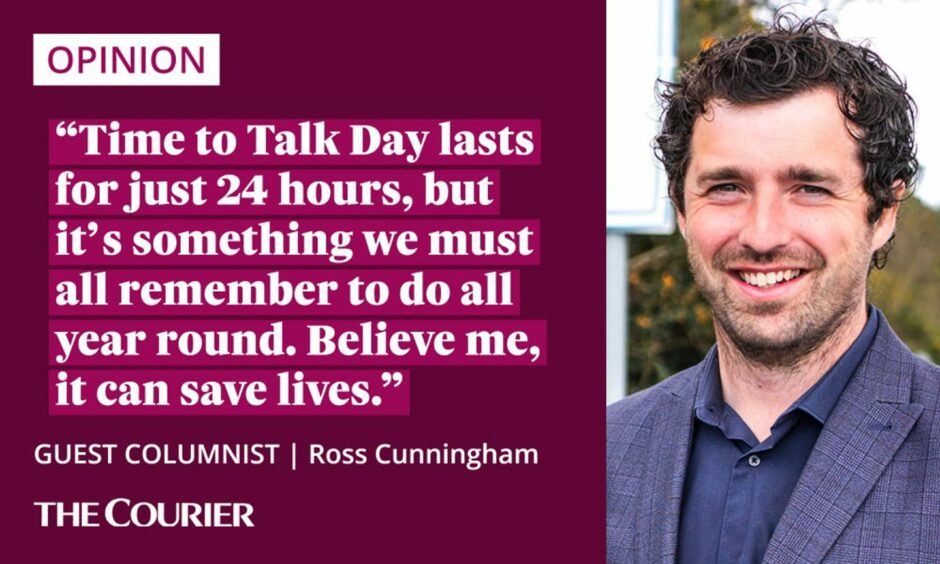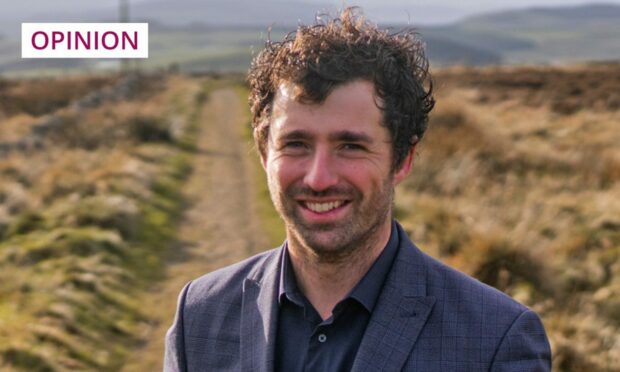I think awareness days are a positive thing. I’ve heard lots of comments dismissing them for various reasons. But it’s a day, week or sometimes a month every year when an important cause or a health condition gets a little bit of a spotlight placed on it, in a way it might not otherwise achieve.
It’s a chance to understand what it might be like to walk in someone else’s shoes.
Maybe if we all did a bit more of that the world would be a better place.
It’s easy for people to take things in their lives for granted. Often we don’t stop to appreciate the barriers so many people face on a daily basis.
An important one for me was Time to Talk Day earlier this month.
It’s an opportunity to highlight the benefits of opening up, to talk about our mental health. And it’s a message that can truly change and save lives.

I was recently struck by a particularly powerful campaign video launched by mental health charity SAMH.
The kind where I felt a wee lump in my throat while I was watching it.
The video shows a number of different people, played by actors, from across Scotland who look lost, hopeless, and with what looks like the weight of the world on their shoulders.
A voiceover of their friends asking if they are ok plays in the background, leading to the final question: “Are you thinking about suicide?”.
The message of the campaign is: if you’re worried someone you know is thinking about suicide, ask them about it.
I found the strength to talk about my mental health
The reason the video is so impactful to me is because there was a time when I thought about suicide.
I am thankfully no longer in that place. And I haven’t been since 2017. But the memories of that sense of despair, the feeling of being alone, and the anxiety I felt are still very vivid.
I had been going through a period of severe depression. Over a number of weeks I had been crying everyday. I had become exhausted from a lack of sleep and had absolutely no desire to eat anything.
My anxiety was so high it had become uncontrollable. And with no end to how I was feeling in sight, I just wanted to escape it all.
At the time, suicide felt like my only option.
It’s horrible thinking back to that time. It really felt like I was drowning.
It can be hard to believe that those are even my memories and not something from a nightmare.
But the most significant step in recovering from the darkness that had almost overcome me was talking about how I was feeling.
It wasn’t easy. For a long, long time in my life I tried not to talk about my feelings. I saw it as a weakness.
But coming through the period I described has made me realise that speaking about your mental health may be one of the bravest things you will ever do.
I now try my best to encourage others to do it, alongside advocating the mental health benefits of the outdoors.
Epilepsy takes its toll on people’s mental health
Last September, I began working for a charity called Epilepsy Scotland. And, as it happens, earlier this week was International Epilepsy Day.
There are around 58,000 Scots living with epilepsy – the tendency to have repeated seizures which start in the brain. And many of those affected live with uncontrolled seizures.
It means someone with epilepsy could be going about their life – perhaps going to the supermarket, getting on the bus, attending a job interview, going on a night out, trying to enjoy a first date – with the constant anxiety that a seizure could happen at any time.
It’s beyond comprehension how difficult that must be for someone.
Mental health issues such as depression and anxiety are common for people with epilepsy. But support is there, including through support services available at Epilepsy Scotland.
Our Youth Group member, Niamh, shares her experiences of living with epilepsy. The struggles she has had with her mental health and the support she has received from her closest friends: https://t.co/2qpc7HX7lQ#TimeToTalkAboutEpilepsy #MentalHealth #Epilepsy #EpilepsyAwareness pic.twitter.com/ReJWX2ZgBz
— Epilepsy Scotland (@epilepsy_scot) February 14, 2023
We have recently launched a national survey to better understand the impact epilepsy can have on someone’s mental health.
It’s part of a campaign titled It’s Time to Talk about Epilepsy.
The anonymous survey runs until Monday March 13, and the results will used to inform the charity and elected representatives about the specific support that may be required to improve the lives of people living with epilepsy.
It’s important for people living with epilepsy to have their voices heard through this survey. But I also hope this campaign reminds everyone to be open about their mental health. To talk to others, and not to keep things bottled up.
Time to Talk Day lasts for just 24 hours, but it’s something we must all remember to do all year round. Believe me, it can save lives.
• If you need to talk to someone, Samaritans are available 24 hours a day, 365 days a year. Call free on 116 123.
Ross Cunningham is a policy and communications manager at Epilepsy Scotland and a mental health and outdoors advocate and campaigner.












Conversation